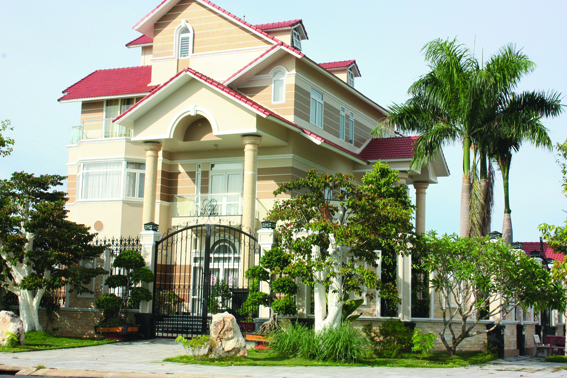The tax authorities’s first specialized inspection of transfer pricing in 2013 has revealed shocking results as hundreds of loss-reporting foreign-invested enterprises across the country evaded taxes and were forced to pay hundreds of billion of dong in tax arrears.
Inspections at 2,110 enterprises nationwide had prompted them to cut their loss totaling over VND 4,192 billion (nearly USD 200 million) and pay taxes and fines worth over VND 988 billion (roughly USD 47 million), the Thanh Nien (Young People) daily reported this month, noting that the fine and tax amounts collected from foreign direct investment (FDI) businesses accounted for 40% of the total, with the average rate of VND 1.73 billion (over USD 82,000) per enterprise.
This figure, however, showed just a part of the tax evasion panorama of the foreign-invested sector when 720 (nearly 83%) out of 870 inspected FDI enterprises committed violations, according to reports from 63 provincial tax departments nationwide.
Particularly, in some provinces, violations were found in all inspected FDI enterprises, including Quang Tri with 27; Thai Nguyen, 20; Tay Ninh, 18; Ben Tre 17; Hoa Binh and Bac Giang, 16 each; and Gia Lai, 15.
In other cities and provinces, the rate was also very high, such as Hanoi which recorded 326 violating enterprises out of 332 inspected. Tax inspections at foreign-invested enterprises in the capital city helped cut their loss by over VND 1,575 billion (roughly USD 75 million) and collect tax arrears worth nearly VND 498 billion (roughly USD 23.7 million). In Ho Chi Minh City, the figures were respectively 164 and 193 enterprises and over VND 870 billion (USD 41.4 million) and nearly VND 173 billion (USD 8.2 million).
The inspections found that the most common trick played by FDI enterprises to evade taxes was hiking up prices of input materials and lowering export prices to make losses or reduce profits in books. This practice was largely seen in enterprises with exclusive technology producing domestically unpopular products.
To turn input prices high and output prices low, FDI enterprises usually bought materials from and sold products to their parent companies. The screenplay was that parent companies overseas would sign production contracts with firms in third countries at high prices and then sub-contract the production to their affiliates in Vietnam at much lower prices. The materials for the subcontract production in Vietnam were supplied by parent companies at unreasonably high prices, leading to constant losses reported by their Vietnam-based affiliated companies for years.
As major capital contributors to joint ventures with local enterprises, foreign investors also took the advantage of having the right to decide on the pricing of goods and materials to sell goods, materials and supplies to their affiliates at much lower prices as a way to transfer pre-tax profits overseas, a Ministry of Finance official said.
Another popular practice by foreign investors was to make capital contribution to joint ventures with domestic enterprises with out-of-date machinery and technology at prices much higher than their real value. This had largely hiked their capital contribution values, causing loss to state budget revenues and putting local enterprises in a disadvantaged position.
FDI enterprises providing goods of world-known makes often played the trick of unreasonably hiking the value of their makes which must be paid by Vietnamese parties while the latter still had to bear expenses for advertising these makes in Vietnam.
General Director of Taxation Bui Van Nam said the tax sector had listed enterprises committing transfer pricing frauds for further inspection but refused to name them.
He stressed it was not easy to identify transfer pricing activities, which required not only control of input material prices but also thorough review and analysis to acquire independent comparative data. Adoption of new prices and tax collection could be applied to enterprises only when their prices were proven unreasonable as compared with market prices and this could not be done without a complete system of data and standards, Nam said.
Economist Ngo Tri Long also agreed there must be a system of complete and diversified data for pricing comparison given experienced international groups doing transnational business with the aid of proficient lawyers and finance specialists that would easily outstrip local tax inspectors who were lacking in both quantity and qualification.
Violating FDI enterprises must be handled under law without any concession to ensure a fair investment environment for domestic investors, Long stressed, citing the Tax Administration Law’s provision on advance pricing in affiliated transactions under which violating FDI enterprises must have their prices assessed by tax authorities when the latter has reached agreement in advance on market prices in affiliated transactions.
Dr. Luu Bich Ho, former director of the Development Strategy Institute, warned FDI enterprises’ transfer pricing had grown increasingly complex and must be strictly dealt with, saying otherwise domestic production and consumers would be hurt as a result of the domestic market, prompted by import price hikes, suffering sham prices higher than the regional level, particularly for goods and services exclusively supplied by foreign investors.
He stressed the importance to control prices of imported machinery, equipment, materials and supplies as early as at the stage of project appraisal and licensing and throughout project implementation, inspection, audit and tax collection rather than merely controlling import prices through the customs.
Experts attributed rampant transfer pricing practice to the country’s limited and changing tax policies, suggesting adjustment of tax policies to conform with international practice. The corporate income tax should be reduced to the regional level or even lower while tax policies should be made public and easy to anticipate, the experts said.
Vietnam should improve its legal framework against transfer pricing and introduce an anti-transfer pricing law in the longer run, Dr. Le Xuan Truong from the Finance Institute said, recommending reduction of tax incentives, specifically limiting social policies in tax incentives, and empowerment of provincial tax departments in tax investigation.
Nguyen Trong Hanh, former deputy director of Ho Chi Minh Tax Department, also said Vietnam should learn from the Republic of Korea and Japan to tax enterprises based on their product unit or sale revenues as a way to tackle transfer pricing.
Economist Bui Kien Thanh told the Thanh Nien that Vietnam’s dreamlike tax and land policies to lure foreign investment over the past 25 years had created legal loopholes for foreign investors to make use of. He pointed out sham loss reported by foreign-invested joint ventures for years not only caused tax revenue loss but also took toll on Vietnamese parties in these joint ventures which had to make up for such loss.
Economist Pham Chi Lan also agreed current foreign investment incentives were no longer appropriate and should be narrowed down only to some particular sectors such as agriculture. Vietnam should now focus on improving its investment environment, including simplified administrative procedures, better infrastructure and qualified human resources, she told the Thanh Nien.
According to the Ministry of Planning and Investment’s Foreign Investment Agency, Vietnam attracted FDI worth USD 22.35 billion in 2013, up 35.9% from 2012. The figure included 1,530 new projects with a total registered capital close to USD 14.5 billion, up nearly 67% over the previous year. FDI disbursement reached USD 11.5 billion last year, up 9.9% year on year.
Japan remained the largest investor with a total capital of USD 5.875 billion, accounting for 26.3% of FDI capital in the country, followed by Singapore with USD 4.76 billion (21.3%) and South Korea with USD 4.46 billion (20%).-
| Result of inspection at FDI enterprises | |||||
| Unit: billion dong (rounded figure) | |||||
|
|
|
Number of inspected enterprises |
Number of violating enterprises |
Amount of tax arrears and fines |
Loss reduction amount |
| 1 |
Hanoi |
332 |
326 |
498 |
1,575 |
| 2 |
Ho Chi Minh City |
193 |
164 |
173 |
870 |
| 3 |
Quang Tri |
27 |
27 |
2.3 |
1.2 |
| 4 |
Thai Nguyen |
20 |
20 |
3.1 |
24.3 |
| 5 |
Tay Ninh |
18 |
18 |
5.3 |
63 |
| 6 |
Hoa Binh |
16 |
16 |
3.6 |
46 |
| 7 |
Ben Tre |
17 |
15 |
1.5 |
21 |
| 8 |
Hai Phong |
50 |
12 |
28.8 |
169 |
| 9 |
Ninh Binh |
10 |
8 |
1.2 |
119 |
| 10 |
Nam Dinh |
6 |
5 |
1.6 |
8.2 |
| Source: General Department of Taxation | |||||

